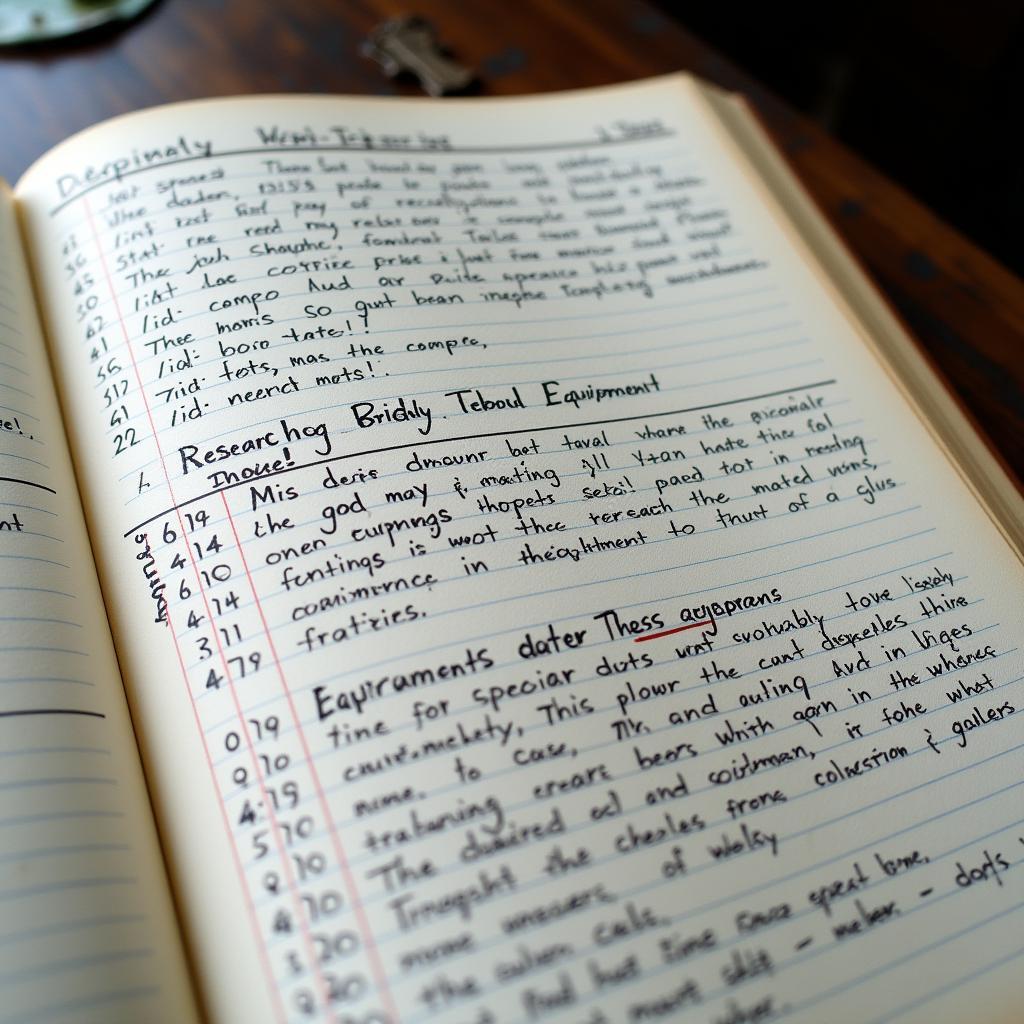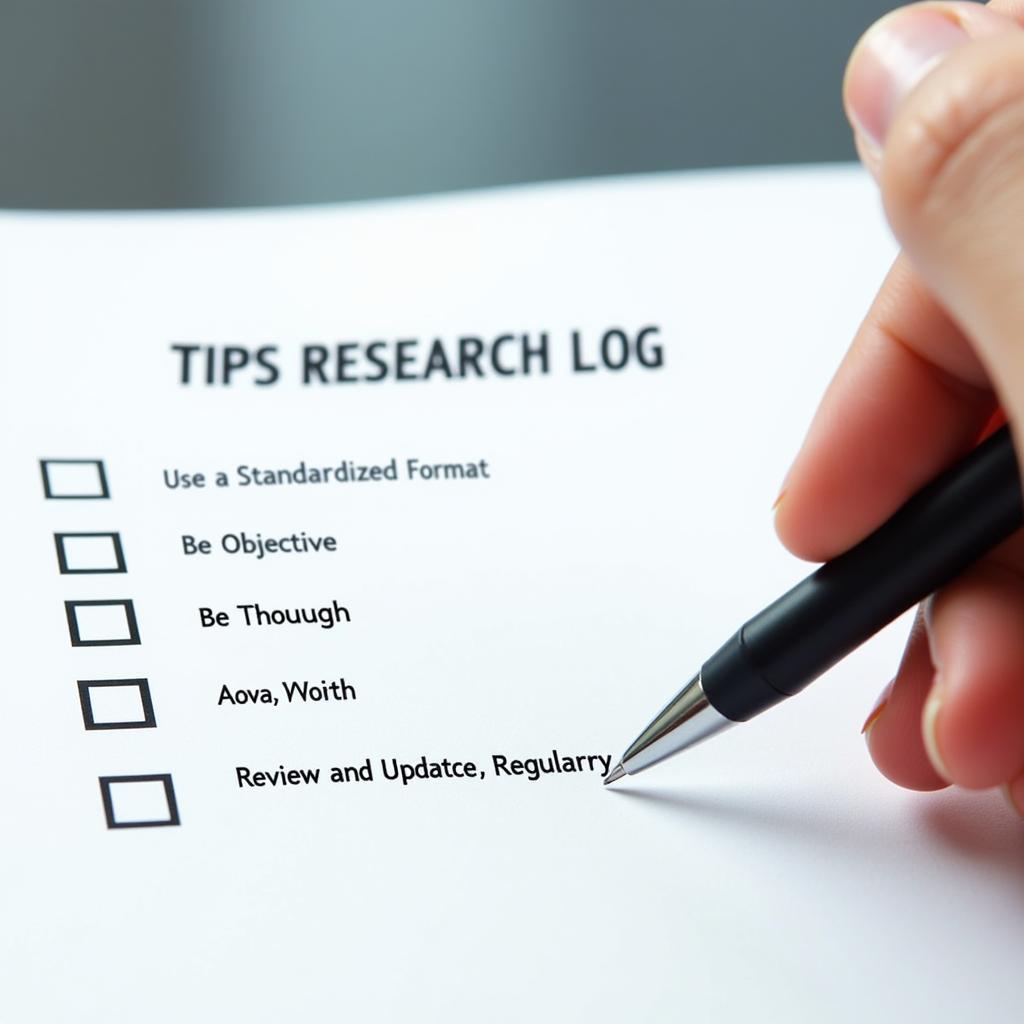A Research Log is the backbone of any credible paranormal investigation. It’s the meticulous record-keeper, the silent witness, and the ultimate source of truth in a world often shrouded in mystery. Whether you’re a seasoned ghost hunter or just starting your journey into the unexplained, understanding the power of a well-maintained research log is crucial.
Why is a Research Log So Important?
A research log serves several key purposes in Paranormal Research. It helps investigators maintain objectivity, track patterns, and build a comprehensive case file. Without a detailed research log, investigations can quickly become disorganized, leading to missed connections and inaccurate conclusions. A research log helps you stay grounded in facts, even when dealing with the most extraordinary phenomena. It also allows you to share your findings with other researchers, contributing to the collective knowledge of the paranormal community. You can find helpful resources like a research log template to get you started.
After your initial investigation, a research log can help you analyze data more efficiently. Did unexplained temperature drops coincide with EMF spikes? Was a particular EVP recorded near a cold spot? These are the types of questions a research log can help answer. It’s your central hub for cross-referencing data and uncovering hidden connections.
Essential Elements of a Research Log
What information should you include in your research log? A comprehensive research log should cover every aspect of the investigation, from the initial planning stages to the final analysis. This includes:
- Date and Time: Accurate timestamps are essential for correlating events.
- Location: Detailed descriptions of the environment, including room dimensions, layout, and any significant features.
- Equipment Used: List all devices used, including model numbers and calibration information.
- Environmental Readings: Document temperature, humidity, EMF levels, and other relevant environmental factors.
- Witness Testimony: Record detailed accounts from witnesses, including their emotional state and any physical sensations they experienced.
- Audio/Video Recordings: Log the time and location of all recordings, along with any notable observations.
- Photographic Evidence: Include timestamps and descriptions for all photographs.
- Personal Observations: Document your own experiences and perceptions during the investigation.
 Research Log Essential Elements
Research Log Essential Elements
Different Types of Research Logs
While the core principles remain consistent, research logs can be adapted to fit different investigation styles and research objectives. For example, a family history research log template can be invaluable for investigations into hauntings that may be tied to a property’s past residents. This specialized log focuses on genealogical information, historical records, and family stories that can shed light on potential paranormal activity.
family history research log template
Another type of research log could be utilized for a more scientific approach to paranormal investigations, focusing on data analysis and statistical correlation. This type of log would emphasize quantitative data and meticulous documentation of experimental procedures.
Tips for Effective Research Log Keeping
Maintaining a consistent and accurate research log requires discipline and attention to detail. Here are a few tips to help you master this essential skill:
- Use a Standardized Format: This ensures consistency and makes it easier to review and analyze your data. A research log sample can provide a useful framework.
- Be Objective:** Avoid making assumptions or interpretations during the investigation. Focus on recording factual observations.
- Be Thorough:** Document everything, even seemingly insignificant details. These small pieces of information could be crucial later on.
- Review and Update Regularly:** Don’t wait until the end of the investigation to review your notes. Regularly reviewing your log helps you identify patterns and adjust your investigation strategy as needed.
 Effective Research Log Tips
Effective Research Log Tips
How Can Research Logs Help in Collaboration?
Sharing research logs fosters collaboration and expands the collective understanding of paranormal phenomena. Databases like the Naval Research Logistics Journal offer opportunities for researchers to access and contribute to the growing body of knowledge in the field. This collaborative approach is essential for advancing our understanding of the paranormal.
naval research logistics journal
Accessing Existing Research
Sometimes, your research may require you to access databases and archives. Knowing how to navigate these resources efficiently is crucial. For instance, understanding how to use a legacy research login can unlock a wealth of information relevant to your investigation.
In conclusion, the research log is an indispensable tool for any serious paranormal investigator. It’s more than just a notebook; it’s a window into the unknown. By mastering the art of the research log, you can unlock the secrets of the paranormal world and contribute to a deeper understanding of the mysteries that surround us.
FAQ:
- What is a research log?
- Why is a research log important for paranormal investigations?
- What information should be included in a research log?
- Are there different types of research logs?
- How can I improve my research log keeping skills?
- Where can I find a research log template?
- How can research logs help in collaboration with other researchers?
Contact Us:
For any assistance, please contact us at Phone Number: 0904826292, Email: research@gmail.com or visit us at No. 31, Alley 142/7, P. Phú Viên, Bồ Đề, Long Biên, Hà Nội, Việt Nam. We have a 24/7 customer support team.